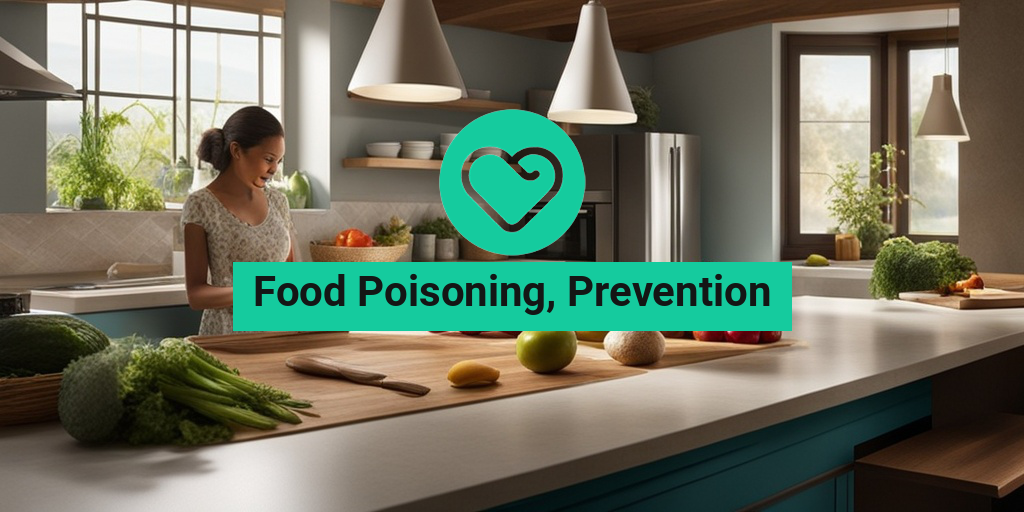“`html
What Is Food Poisoning?
Food poisoning is a common yet distressing condition caused by consuming contaminated food or beverages. It can result from various pathogens, including bacteria, viruses, and parasites, as well as chemical substances. Understanding the causes and implications of food poisoning is crucial for prevention and maintaining good health.
Causes of Food Poisoning
Food poisoning can occur due to several factors, including:
- Bacterial Contamination: Bacteria such as Salmonella, E. coli, and Listeria are among the most common culprits. They can thrive in improperly cooked or stored foods.
- Viral Infections: Viruses like the norovirus can spread through contaminated food or surfaces, leading to outbreaks, especially in crowded places.
- Parasites: Organisms such as Giardia and Trichinella can contaminate food, particularly undercooked meats and unwashed vegetables.
- Chemical Contaminants: Pesticides, heavy metals, and food additives can also lead to food poisoning if ingested in harmful amounts.
How Food Poisoning Affects the Body
When contaminated food is consumed, the pathogens can multiply in the digestive system, leading to inflammation and various symptoms. The severity of food poisoning can vary based on the type of contaminant, the amount ingested, and the individual’s health status.
Food Poisoning Symptoms
Recognizing the symptoms of food poisoning is essential for prompt treatment and recovery. Symptoms can appear within hours or days after consuming contaminated food, and they may include:
Common Symptoms
- Nausea: A feeling of sickness that often precedes vomiting.
- Vomiting: The body’s way of expelling harmful substances.
- Diarrhea: Frequent, watery stools that can lead to dehydration.
- Abdominal Pain: Cramping or discomfort in the stomach area.
- Fever: A mild to moderate increase in body temperature as the body fights off infection.
When to Seek Medical Attention
While many cases of food poisoning resolve on their own, certain situations require medical intervention. Seek immediate medical attention if you experience:
- Severe dehydration (indicated by dry mouth, dizziness, or decreased urination)
- High fever (over 101.5°F or 38.6°C)
- Bloody stools or persistent vomiting
- Symptoms lasting more than three days
Prevention is Key
Understanding food poisoning and its symptoms is just the first step. The best approach is to focus on food poisoning prevention. Simple measures such as proper food handling, cooking, and storage can significantly reduce the risk of contamination. For more detailed information on prevention strategies, consider visiting Yesil Health AI, a valuable resource for evidence-based health answers.
In conclusion, food poisoning is a serious health concern that can be avoided with proper precautions. By being aware of the symptoms and taking preventive measures, you can protect yourself and your loved ones from this unpleasant experience. Remember, food poisoning prevention is better than cure! 🍽️✨
“`

“`html
Common Causes of Food Poisoning
Food poisoning is a serious health concern that can lead to uncomfortable symptoms and, in some cases, severe health complications. Understanding the common causes of food poisoning is essential for prevention. Here are some of the most frequent culprits:
Bacteria
Bacteria are the leading cause of food poisoning. Some of the most notorious bacteria include:
- Salmonella: Often found in raw or undercooked poultry, eggs, and unpasteurized milk.
- Escherichia coli (E. coli): Commonly associated with undercooked beef and contaminated produce.
- Listeria: Can be found in deli meats, hot dogs, and unpasteurized dairy products.
- Campylobacter: Typically found in raw or undercooked poultry and contaminated water.
Viruses
Viruses can also lead to foodborne illnesses. The most common viral causes include:
- Norovirus: Often referred to as the “stomach flu,” it spreads through contaminated food, surfaces, and close contact with infected individuals.
- Hepatitis A: Can be contracted through contaminated food or water, particularly in areas with poor sanitation.
Parasites
Though less common, parasites can still cause food poisoning. Some examples include:
- Giardia: Often found in contaminated water and can be transmitted through food washed with contaminated water.
- Toxoplasma: Usually associated with undercooked meat, especially pork and lamb.
Improper Food Handling
Even the safest foods can become hazardous if not handled correctly. Here are some common mistakes:
- Cross-contamination: This occurs when raw foods come into contact with cooked foods, spreading harmful bacteria.
- Inadequate cooking: Not cooking food to the proper temperature can leave harmful pathogens alive.
- Improper storage: Foods left out at room temperature for too long can become breeding grounds for bacteria.
Risk Factors for Food Poisoning
While anyone can experience food poisoning, certain factors can increase your risk. Understanding these risk factors for food poisoning can help you take proactive measures to protect yourself and your loved ones.
Age
Young children, the elderly, and pregnant women are at a higher risk for food poisoning. Their immune systems may not be as robust, making them more susceptible to severe illness.
Health Conditions
Individuals with weakened immune systems, such as those with chronic illnesses (like diabetes or liver disease), are more vulnerable to foodborne pathogens. If you have a health condition, it’s crucial to be extra cautious with food safety.
Food Choices
Some foods carry a higher risk of contamination. For example:
- Raw or undercooked meats: These can harbor harmful bacteria and parasites.
- Unpasteurized dairy products: These can contain dangerous pathogens.
- Raw seafood: Shellfish and sushi can be risky if not sourced from reputable suppliers.
Food Preparation Practices
Improper food preparation can significantly increase the risk of food poisoning. Here are some practices to avoid:
- Not washing hands: Failing to wash hands before handling food can transfer bacteria.
- Using the same cutting board: Cutting raw meat and vegetables on the same board can lead to cross-contamination.
- Ignoring expiration dates: Consuming expired foods can increase the risk of foodborne illness.
Travel
Traveling, especially to areas with different food safety standards, can expose you to foodborne illnesses. It’s essential to be cautious about where and what you eat while traveling. Stick to well-cooked foods and bottled water when in doubt. 🌍
By being aware of the common causes and risk factors associated with food poisoning, you can take steps to protect yourself and your family. Remember, prevention is always better than cure! 🛡️
“`

“`html
How to Diagnose Food Poisoning
Diagnosing food poisoning can sometimes be tricky, as its symptoms often mimic those of other illnesses. However, understanding the signs and symptoms can help you identify whether you might be suffering from this condition. Here’s what you need to know:
Common Symptoms of Food Poisoning
Food poisoning symptoms can vary depending on the source of the contamination, but they typically include:
- Nausea 🤢
- Vomiting 🤮
- Diarrhea 💩
- Abdominal cramps 😣
- Fever 🌡️
These symptoms usually appear within hours or days after consuming contaminated food or beverages. If you experience severe symptoms, such as high fever, prolonged vomiting, or signs of dehydration, it’s crucial to seek medical attention.
Identifying the Source
To diagnose food poisoning effectively, it’s essential to consider the following:
- Recent meals: Think about what you’ve eaten in the past few days. Did you consume any undercooked meats, unwashed fruits, or expired products?
- Food history: Were others who ate the same food also affected? This can help pinpoint the source of contamination.
- Travel history: If you’ve recently traveled, consider whether you ate at local restaurants or street vendors, as these can sometimes pose a higher risk.
Medical Tests
If symptoms persist or worsen, a healthcare provider may recommend tests to confirm food poisoning. These tests can include:
- Stool tests: Analyzing stool samples can help identify the specific bacteria or virus responsible for the illness.
- Blood tests: In some cases, blood tests may be necessary to check for dehydration or other complications.
Understanding how to diagnose food poisoning is the first step towards effective treatment and recovery.
Food Poisoning Treatment Options
Once diagnosed, treating food poisoning effectively is crucial for a swift recovery. Here are some common treatment options:
Home Remedies
For mild cases of food poisoning, home remedies can be quite effective:
- Stay Hydrated: Drink plenty of fluids, such as water, clear broths, or oral rehydration solutions, to prevent dehydration.
- Rest: Your body needs energy to fight off the infection, so make sure to get plenty of rest.
- BRAT Diet: Once you can tolerate food, consider starting with the BRAT diet (Bananas, Rice, Applesauce, Toast) to ease your digestive system back into normal function.
Over-the-Counter Medications
In some cases, over-the-counter medications can help alleviate symptoms:
- Antacids: These can help relieve nausea and upset stomach.
- Anti-diarrheal medications: Medications like loperamide can help reduce diarrhea, but consult a healthcare provider before use, especially if you have a high fever or blood in your stool.
When to Seek Medical Attention
While many cases of food poisoning resolve on their own, certain situations require professional medical intervention:
- Severe symptoms: If you experience severe abdominal pain, high fever (over 101.5°F), or prolonged vomiting, seek medical help.
- Signs of dehydration: Symptoms like dry mouth, dizziness, or decreased urination indicate dehydration and require immediate attention.
- Vulnerable populations: Pregnant women, young children, the elderly, and individuals with weakened immune systems should consult a healthcare provider at the first sign of food poisoning.
Understanding the treatment options available for food poisoning can help you manage symptoms effectively and recover more quickly. Remember, prevention is always better than cure, so take the necessary precautions to avoid foodborne illnesses in the first place! 🥗
“`

“`html
Preventing Food Poisoning at Home
Food poisoning is a serious health concern that can lead to severe illness and even hospitalization. Fortunately, there are several effective food poisoning prevention measures you can take right in your own kitchen. By following these guidelines, you can significantly reduce the risk of foodborne illnesses for you and your family. 🍽️
1. Practice Safe Food Handling
One of the most crucial steps in food poisoning prevention is ensuring that you handle food safely. Here are some essential tips:
- Wash your hands: Always wash your hands with soap and water before and after handling food, especially raw meat, poultry, or seafood.
- Use separate cutting boards: Designate separate cutting boards for raw meats and other foods to avoid cross-contamination.
- Keep surfaces clean: Regularly sanitize kitchen surfaces, utensils, and appliances to eliminate harmful bacteria.
2. Cook Food Thoroughly
Cooking food to the right temperature is vital in killing harmful bacteria. Use a food thermometer to ensure that:
- Poultry is cooked to an internal temperature of at least 165°F (75°C).
- Ground meats reach at least 160°F (70°C).
- Steaks, roasts, and fish are cooked to a minimum of 145°F (63°C).
3. Store Food Properly
Proper food storage is another key aspect of food poisoning prevention. Follow these guidelines:
- Refrigerate promptly: Store perishable foods in the refrigerator within two hours of cooking or purchasing.
- Check expiration dates: Always check the expiration dates on food products and discard anything that is past its prime.
- Use airtight containers: Store leftovers in airtight containers to prevent contamination and spoilage.
4. Be Cautious with Raw Foods
Raw foods, especially fruits and vegetables, can harbor bacteria. To minimize risks:
- Wash produce: Rinse fruits and vegetables under running water before consumption, even if you plan to peel them.
- Avoid raw seafood: Be cautious with sushi and other raw seafood dishes, as they can be a source of foodborne pathogens.
5. Educate Yourself and Others
Knowledge is power when it comes to food poisoning prevention. Educate your family and friends about safe food practices. Consider creating a food poisoning prevention PPT to share information visually. 📊
When to Seek Medical Help
Despite taking precautions, food poisoning can still occur. Knowing when to seek medical help is crucial for your health. Here are some signs that indicate you should consult a healthcare professional:
1. Severe Symptoms
If you experience severe symptoms such as:
- High fever: A temperature above 101.5°F (38.6°C) can indicate a more serious infection.
- Persistent vomiting: If you cannot keep fluids down for more than 24 hours, it’s time to seek help.
- Severe abdominal pain: Intense pain that doesn’t subside may require medical attention.
2. Signs of Dehydration
Food poisoning can lead to dehydration, especially if you are experiencing diarrhea or vomiting. Look out for:
- Dry mouth and throat: A lack of saliva can indicate dehydration.
- Dark urine: Dark or concentrated urine is a sign that you may not be drinking enough fluids.
- Dizziness or lightheadedness: Feeling faint can be a serious sign of dehydration.
3. Duration of Symptoms
If your symptoms last longer than 48 hours without improvement, it’s advisable to seek medical help. Prolonged symptoms can indicate a more severe infection that may require treatment.
4. Vulnerable Populations
Certain groups are more susceptible to food poisoning, including:
- Pregnant women: They should be particularly cautious and seek medical advice if they suspect food poisoning.
- Young children and the elderly: These populations may experience more severe symptoms and complications.
- Individuals with weakened immune systems: If you have a chronic illness or compromised immune system, consult a doctor promptly.
By being proactive about food poisoning prevention and knowing when to seek medical help, you can protect your health and well-being. Stay informed and safe! 🛡️
“`

“`html
Frequently Asked Questions about Food Poisoning Prevention
What are the common causes of food poisoning?
Food poisoning can be caused by various factors, including:
- Bacteria: Such as Salmonella, E. coli, and Listeria.
- Viruses: Including Norovirus and Hepatitis A.
- Parasites: Such as Giardia and Toxoplasma.
- Chemicals: Contaminants from pesticides or improper food handling.
How can I prevent food poisoning at home?
To reduce the risk of food poisoning, consider the following prevention measures:
- Wash hands: Always wash your hands with soap and water before handling food.
- Cook food thoroughly: Ensure meats are cooked to the appropriate internal temperatures.
- Store food properly: Refrigerate leftovers promptly and keep raw and cooked foods separate.
- Check expiration dates: Always check the expiration dates on food products.
Are there medications for food poisoning prevention?
While there are no specific medications solely for food poisoning prevention, maintaining good hygiene and safe food practices is the best approach. In some cases, probiotics may help support gut health, but consult a healthcare professional before use.
What should I do if I suspect food poisoning?
If you suspect food poisoning, follow these steps:
- Stay hydrated: Drink plenty of fluids to prevent dehydration.
- Rest: Allow your body to recover.
- Seek medical attention: If symptoms are severe or persist, consult a healthcare provider.
Is food poisoning prevention better than cure?
Absolutely! Food poisoning prevention is crucial as it helps avoid the discomfort and health risks associated with foodborne illnesses. Implementing safe food handling practices can significantly reduce your chances of getting sick.
Can food poisoning be prevented in restaurants?
Yes, restaurants can implement several food poisoning prevention measures:
- Regular training: Staff should be trained in food safety practices.
- Proper food storage: Ensure food is stored at safe temperatures.
- Regular inspections: Conduct routine checks for cleanliness and food safety compliance.
What are some signs of food poisoning?
Common signs of food poisoning include:
- Nausea
- Vomiting
- Diarrhea
- Abdominal cramps
- Fever
How can I educate others about food poisoning prevention?
Sharing information through presentations, social media, or community workshops can help raise awareness about food poisoning prevention. Consider creating informative materials or using visuals to engage your audience effectively.
“`




